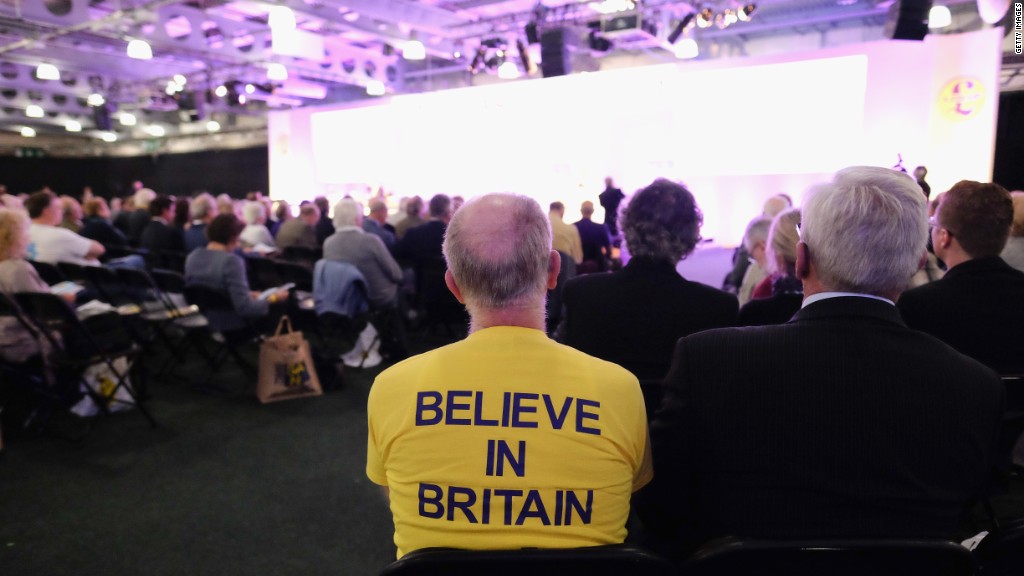
Ominously dark clouds hung over London Heathrow as I landed in the U.K. at the start of the final two weeks of campaigning in the European Union referendum debate.
I have crossed the Atlantic several times since Prime Minister David Cameron set June 23 for the vote on whether Britain should remain a member of the EU, or become the first country to leave the club of 28 nations -- the Brexit scenario.
I've seen how Brits have heard arguments, had statistics blasted at them, seen their top politicians engage in slanging matches, and watched as the ruling Conservative party sank into civil war. A small but firm opinion poll lead for the Remain side has evaporated, and betting firms are cutting the odds on a vote to Leave.
There is now only one question that, no matter where you are or what you're talking about, someone will eventually ask; "do you know how you're going to vote?" Traditional British reserve about personal political choices is being pushed aside by the sheer gravity of the question on the ballot. As Cameron has said, this referendum is far more important than a general election.
Related: What happens if Brexit wins?
Here's why it matters. Virtually every aspect of life has been affected by membership of what was the European Economic Community when the U.K. joined in 1973. It was always going to be that way. In 1974, English judge Lord Denning described the European treaty as that of an incoming tide. "It flows into the estuaries and up the rivers. It cannot be held back."
For more than four decades that tide has been flowing across the U.K. Business has been changed by regulations on issues such as working hours, and rules setting common standards for products such as food and electric light bulbs. Societies have been changed by one of the core European rights -- the freedom of movement. It allowed immigration from poorer European countries to the U.K., and British pensioners to retire easily in sunnier Spain.
European law is everywhere: Air passengers' rights for compensation are governed by the EU, farming was transformed by the Common Agricultural Policy. It has created the Single Market -- the world's largest trading bloc -- allowing automakers to use parts from across Europe to build vehicles they can sell tariff free in the EU, and banks based in the U.K. to operate in the other 27 countries.
Related: Britain's EU vote matters to America
Even though Britain has opted out of two of the EU's landmark projects -- the euro currency and the Schengen area of passport free travel -- EU law is ubiquitous, affecting all. This will change if the British people vote to leave.
The referendum is not just a big political question about the nature of democracy in Europe. Rather there are every day issues on people's minds: Will British expats living in Spain be allowed to stay if the U.K. leaves? Will our exports to Europe suffer? Will we have to rebuild the border between Northern Ireland and Ireland that was dismantled with the 1998 peace agreement.
Related: How much does the EU really cost Britain?
We don't know the answer to many such questions, and it may not be possible to know before the vote. One of the strongest arguments for the Remain camp is that Brexit is too big a risk to take because we can't predict the outcome of divorce negotiations with the EU. "Brexiteers" scoff at this and say it will be in the EU's interest to do reasonable deals with the U.K.
Opinion polls suggest the outcome is too close to call, although late last week one survey showed a big lead for the Brexit campaign. Both sides have claimed new supporters -- a senior Conservative lawmaker defected to Remain; vacuum cleaner entrepreneur James Dyson declared himself in favor of Brexit.
Related: Brexit divides British farming family
Over dinner with my sisters and their husbands this weekend, the discussion inevitably turned to Brexit. I know that the same debate is happening in kitchens across the country. We kept it civil. The cheesecake was excellent and Brexit isn't worth falling out over (not just yet).
But I left with this thought: the vote I cast on June 23 may be the most important in my life because it could change everything.
